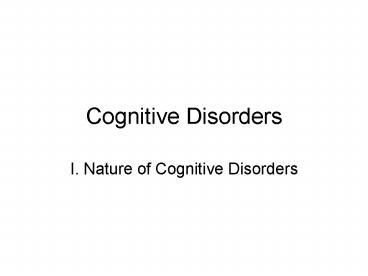Cognitive Disorders - PowerPoint PPT Presentation
1 / 20
Title: Cognitive Disorders
1
Cognitive Disorders
- I. Nature of Cognitive Disorders
2
Definition
- Cognitive disorders disorders in which the
central feature is the impairment of memory,
attention, perception, and thinking.
3
A. DSM History
- Used to be called organic disorders
- Denoted dysfunction of the brain
- Not very descriptive
- DSM-IV uses cognitive
- Better reflects nature of problems
4
B. Assessment
- Mental Status Exam brief interview used to
assess cognitive disorders - 5 major components
- Appearance and behavior
- Mood and affect
- Thought
- Perception
- Sensorium and Intellect
- Sensorium consciousness and awareness of
surroundings
5
Cognitive Disorders
- II. Types of Cognitive Disorders
6
A. Delirium
- Features
- Key feature is disturbed consciousness
- Associated features include
- Clouded sensorium no clear awareness of
surroundings - Problems with attention
- Disturbance in memory
- Incoherent speech
- Perceptual disturbances (e.g., hallucinations)
7
A. Delirium (cont.)
- Statistics and course
- Acute onset (within hours or days) and transient
course (days to a few weeks) - No life-long delirium
- Can be superimposed on another disorder (e.g.,
dementia)
8
2. Statistics and course (cont.)
- Tends to occur more in certain people
- Elderly
- Medically ill (e.g., cancer AIDS)
- Dementia
9
A. Delirium (cont.)
- Causes
- Drugs intoxication, withdrawal, poison
- Delirium tremens tremors and vivid
hallucinations of vermin associated with alcohol
withdrawal - Medications
- Infection
- Head injury
- Various kinds of brain trauma (e.g., stroke)
10
A. Delirium (cont.)
- Treatment
- Attending to precipitating problem
- Treating medical condition counteracting effects
of substance withdrawal using antipsychotic meds - Prevention is most successful
- Recognizing people at risk and paying special
attention to those cases to avoid delirium
11
B. Dementia
- Features
- Key feature is gradual impairment of multiple
cognitive abilities including memory, language,
and judgment - With impaired social/occupational functioning
- Often see global cognitive impairment ability
to solve novel problems goes first, then
overlearned abilities (e.g., vocabulary) - First signs personality change and memory loss
12
B. Dementia (cont.)
- Statistics and course
- Incidence is highest in older adults, but can
onset at almost any age - Not accurate to give one prevalence rate, because
it differs by age group - 65-74 1.29
- 75-84 3.83
- 85 10.14
13
2. Statistics and course (cont.)
- Incidence is the same for males and females
- Onset varies by type of dementia
- e.g., Alzheimers vs. vascular dementia
- People over age 75 at increased risk for dementia
14
B. Dementia (cont.)
- Example Alzheimers Disease
- DSM-IV Criteria (p. 526)
- Development of multiple cognitive deficits
manifested by both - Memory impairment
- One (or more) of the following
- Aphasia
- Apraxia
- Agnosia
- Disturbance in executive functioning
15
DSM-IV criteria (cont.)
- B. Significant impairment and decline
- C. Gradual onset and continuing decline
- - Rule out other dementias and mental disorders
(e.g., Sz)
16
3. Alzheimers (cont.)
- Onset usually in 60s or 70s
- Early signs in 40s and 50s (presenile dementia)
- Definitive diagnosis can only be made on autopsy
where histopathology confirmed - Gross atrophy of the brain
- Neurofibrillary tangles
- Senile plaques
17
B. Dementia (cont.)
- Causes of dementia
- Direct cause linked to type of dementia
- Plaques and tangles ? Alzheimers
- Blocked artery ? vascular dementia
- Genetic factors linked to some dementias
- Multiple genes ? Alzheimers risk
- Single dominant gene ? Huntingtons disease
- Head trauma is a risk factor (e.g., boxers
dementia)
18
4. Causes (cont.)
- Vascular dementia can be influenced by diet as
well as genetic factors (link to heart disease) - Psychosocial factors
- Higher education level is associated with lower
dementia risk - Social resources and family support can improve
life for patients with dementia
19
B. Dementia (cont.)
- Treatment of dementia
- Limited some drugs can improve cognitive
functioning, but only temporary - Psychological treatments
- Memory wallet
- Memory skills training
- Teach to use navigational cues to avoid getting
lost
20
Summary
- Cognitive disorders involve an impairment of
memory, attention, perception, and thinking that
represents a change from previous functioning - Delirium short-lived treat precipitating
factor (e.g., substance withdrawal) or prevent - Dementia gradual, continual decline (e.g.,
Alzheimers) - Dementia treatments are limited help with memory
skills































